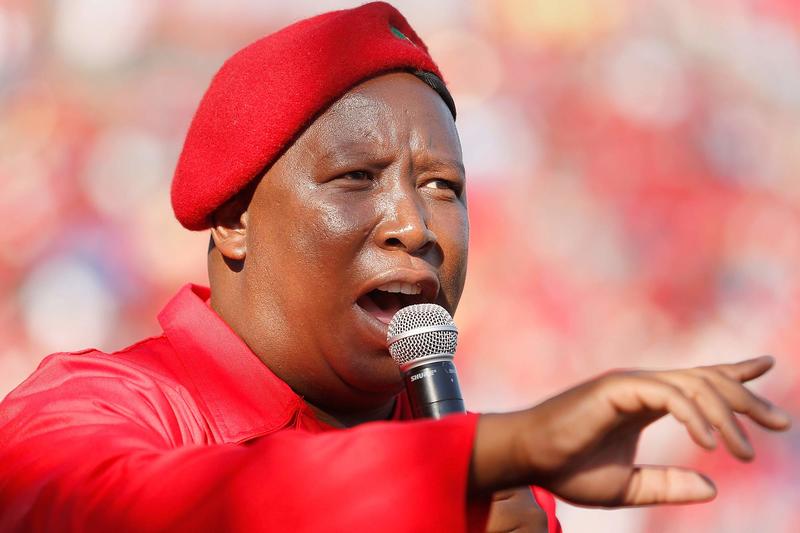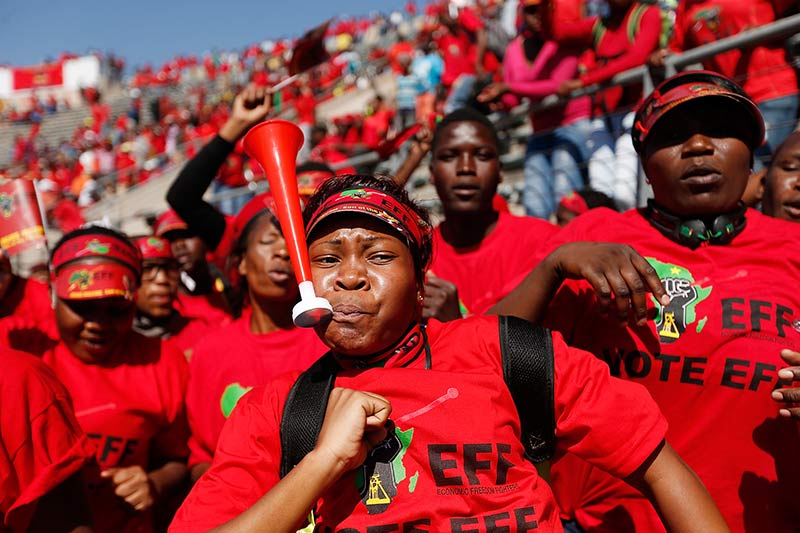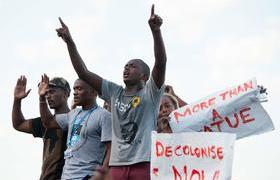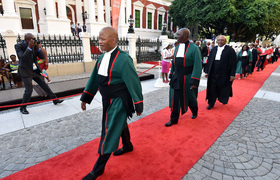Democracy, fascism and the future of the EFF
29 January 2021 | Story Carla Bernardo. Read time 10 min.
More than seven years after its formation, the Economic Freedom Fighters (EFF) continue to dominate headlines. They have, as noted by Dr Imraan Buccus, captured the imagination of South Africans and many across the continent who are fascinated by the politics of the party.
Dr Buccus is a political analyst, a research fellow in political science at the University of KwaZulu-Natal (UKZN) and the director of UKZN’s study-abroad programme on political transformation. He is widely published in the areas of participatory democracy, poverty and civil society. Buccus recently joined the University of Cape Town’s (UCT) 2021 Summer School programme, where he presented a two-hour lecture on the EFF.
The lecture, “Threats to democracy: a critical examination of the EFF”, looked at the politics of the EFF, examined whether it can be framed as fascist, and sought to answer whether the party presents a threat to South Africa’s democracy.
“But by 2012 Malema and Zuma’s relationship became fraught (despite him having stated that he’d kill for the former president).”
The party was formed in July 2013, prompted by the expulsion of “political firebrand” and EFF leader, Julius Malema, from the African National Congress Youth League (ANCYL). Like most of the party’s leadership, Malema has his roots in the ANC, which he joined when he was just nine years old.
Malema had an almost meteoric rise to the top: at 16 he was elected provincial chair of the ANC’s student arm, the Congress of South African Students (COSAS); and a few years later, as COSAS’s national president. In 2003 he became the provincial chair of the ANCYL and five years later, its president.
By this time, Malema was well known and so too was his relationship with former president Jacob Zuma. But by 2012 Malema and Zuma’s relationship became fraught (despite him having stated that he’d kill for the former president) and the ANCYL leader was ousted from the party.
The next year, a few months after its formation, the EFF officially launched in Marikana and, said Buccus, positioned itself as a “champion of the poor”.
On violence
In terms of its ideology, Buccus said that while no one can be certain, the EFF does claim to draw from Marxism–Leninism, Frantz Fanon and Thomas Sankara. There have also been clear links to Zimbabwe’s ZANU–PF political party and former president Robert Mugabe. In terms of a more local influence, he pointed to the “tradition of radical student politics of Limpopo” and the strong influence of former ANCYL president Peter Mokaba on the “red berets”.
While tracing ideology and influence back to Malema’s early days as student and youth leader, Buccus also identified the EFF leader’s “violent posturing” in the early 2000s. Many of the COSAS marches at the time turned violent, often resulting in property damage, theft and looting – the extent of which drew former president Nelson Mandela’s condemnation.
Today the EFF has used violence in numerous contexts: against journalists, both online and in-person; in statements and tweets, such as “the only white man you can trust is a dead white man”; and in response to real grievances, such as racist adverts.
And while the EFF might condone violence and thuggery publicly, their choice to use violence in other contexts, over the years, may well contribute significantly to the enactment thereof.
Fascism / fascist tendencies
Closely linked to concerns about violence and the EFF is the parallel that is often drawn in popular commentary between the party and fascism. To examine this, Buccus provided a brief history of fascism in the early 1900s (embodied by Nazi Germany and Mussolini’s National Fascist Party), its characteristics, and illustrated how the likes of Donald Trump, Jair Bolsonaro and Narendra Modi provide contemporary case studies.
Interesting characteristics to note include “authoritarianism”, “nationalism”, “dictatorial power”, “forcible suppression” and “strong regimentation of society”; that Adolf Hitler rose to power during a period of massive youth unemployment and also touted land reform as part of his agenda; and that both the Nazis and Italy’s fascist party glorified violence (and not in the Fanonian sense).
“Certainly, there are elements of fascism in the behaviour of the EFF.”
And when one considers fascism today, Buccus said, it often centres on immigration and identity and how the latter “relates to the soil”; there’s scorn for “politics as normal” and in its stead, politics as spectacle is drawn to the fore.
Numerous parallels can be drawn between the EFF and the aforementioned characteristics. In addition to their use of violence, Buccus noted that members of the party have become “experts at the art of politics as spectacle”; they have mobilised and militarised young men, in particular; and they are known to amplify a discourse of racial thinking, particularly regarding white and Indian people. But, noted the political analyst, this does not necessarily equate to fascism.
To date, the EFF has not rejected electoral democracy, used violence to disrupt elections and has not spoken about a coup. They also often express their support for the rule of law and constitutionalism. This would, in large part, mean that the EFF is not fascist.
“But certainly, there are elements of fascism in the behaviour of the EFF,” he said.
Fertile ground
A more accurate description of the EFF would be that it is “authoritarian, and there are predatory opportunists within the ranks of the EFF”. However, what is concerning is that historically, when fascist tendencies have emerged, it has coincided with serious social issues and the ruling class’s inability to resolve them. South Africa provides fertile ground for this to occur.
The country is, of course, recognised as the most unequal society in the world. In global terms, our economic crisis is severe. On a national level, we have an “unemployment blood bath”, yet youth unemployment is much higher, and class remains racialised.

While the black middle class has increased from between 300 000 to 400 000 in 1994 to around five million today, and there’s deracialisation at the apex of our social strata (but not an absence of racism, according to Buccus; it’s usually just reserved for private spaces), re-racialisation is occurring at the base.
“At the base of our social strata, there’s a contestation for survival. People don’t have the time for the niceties the middle class has in terms of race,” he said.
The EFF can appreciate the political and economic crisis, and the fact that masses of young people continue to live on the margins provides ample space for the party. In a country like South Africa, where the state is struggling to deal with social issues, the idea of a strong – often male – figure becomes politically attractive to many.
“When you live on the margins, when you live with no hope, the EFF provides a kind of hope – albeit opportunistic – and provides possibilities for one to rescue historical humiliation. And the EFF becomes really attractive.”
Space on the left
While the EFF claims to be left-wing, and is the only such party with any notable electoral support, Buccus believes there remains a great amount of space on the political spectrum. He said that while many believe South Africa’s democracy will be enhanced by an opposition that comes from the centre-right, like the Democratic Alliance, he disagrees.
“I’ve always maintained that the position of the ANC can only credibly and substantively be contested from the left.”
“I’ve always maintained that the position of the ANC can only credibly and substantively be contested from the left,” said Buccus.
And already, potential contenders exist. Numerous social movements occupy the left of the political spectrum, such as the Unemployed People’s Movement and the country’s largest movement, Abahlali baseMjondolo.
Interestingly, noted Buccus, is that most, if not all, of these leftist social movements claim that the EFF is opportunistic and does not engage with radical grassroots movements. The leaders of these movements continually distance themselves from and condemn the EFF.
“And that makes for some interesting analysis. If the EFF claims to be left, should there not be a kind of natural affinity for the EFF by social movements?” asked Buccus.
In concluding the lecture, Buccus said that the EFF’s future remains uncertain, and so too does the future of the South African lefts.
Concerning elections, Buccus noted, the “red berets” may currently hold minor electoral support, but they have the potential to garner the youth vote. This is if they can find a way to encourage young people to register and participate in elections – something that historically has been difficult to achieve.
Space for the EFF to win votes is also widening as the ANC is pushed to the periphery, which is common for liberation movements across the continent. As Buccus pointed out, no liberation movement in Africa has remained in power beyond five decades.
But, again, that space to the left of the ANC can still be occupied by a new political party by, perhaps, cohesion between various trade union movements and some of the larger social movements in South Africa.
“There are possibilities that the space occupied by the EFF could be disrupted. And I would suggest, perhaps, seriously disrupted.”
 This work is licensed under a Creative Commons Attribution-NoDerivatives 4.0 International License.
This work is licensed under a Creative Commons Attribution-NoDerivatives 4.0 International License.
Please view the republishing articles page for more information.










